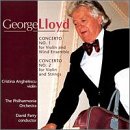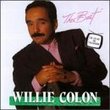| All Artists: George Lloyd, David Parry, Philharmonia Orchestra of London Title: Lloyd: Violin Concertos Members Wishing: 0 Total Copies: 0 Label: Albany Records Release Date: 6/29/1999 Genre: Classical Styles: Forms & Genres, Concertos, Symphonies Number of Discs: 1 SwapaCD Credits: 1 UPC: 034061031628 |
Search - George Lloyd, David Parry, Philharmonia Orchestra of London :: Lloyd: Violin Concertos
 | George Lloyd, David Parry, Philharmonia Orchestra of London Lloyd: Violin Concertos Genre: Classical |
Larger Image |
CD DetailsSimilar CDs
|
CD ReviewsOne good, one not so good Rodney Gavin Bullock | Winchester, Hampshire Angleterre | 10/16/2001 (4 out of 5 stars) "George Lloyd suffered from several disabilities over his lifetime. First, he was English - or Cornish, to be precise. English composers are always sneered at by the local critics and musical establishment, though the audiences usually love them when allowed to hear the music. Secondly, he found himself writing tonal music at a time when all that was considered dreadfully old fashioned. Finally, he became badly shell-shocked after serving with the Arctic convoys during WW2 and it was not until the late 1940s that he began to recover. His music made some headway before the war but by the time he took up composition seriously afterwards, tonality was under attack and from the late 50s, even the BBC deserted composers writing in this style. Lloyd's fortunes returned when one of his symphonies was played on Radio 3, the BBC classical station, during the late 70s. Listeners rang and were ecstatic. The enterprising Albany company went on to record all the symphonies and many other works and this disc is one of that series. As has happened before, the Americans had discovered the worth of a British composer before his fellow countrymen.Neither concerto is with full orchestra, the first on disc is with strings, the other with winds. The one with strings, in four movements, is a delight and both the slow movements (1 and 3) carry considerable emotional weight. The sound world of the opening is very like that of the Swiss composer, Frank Martin. The music is elegiac and meditative and often very beautiful. A rollicking second movement is followed by another slow one, intensely lyrical and passionate but without the despair of the first. The concerto ends with a dance-like movement based on a folk-like tune. This is a very fine work with a neo-classical feel which is odd in a composer who normally writes big romantic works.The concerto with winds is a relative disappointment. Lloyd exploits the coloristic potential of this combination well but his melodic invention is not quite up to the first piece. The music meanders and does not seem to know where it is headed and there is a degree of note-spinning. The slow movement is the best, with some Stravinskian wind chords spicing up the mixture. Even so, the emotional landscape is rather flat, with little to tug the heart strings either way. The final giocoso is Lloyd's worst misjudgement. The main theme is a jaunty little theme, almost like a nursery rhyme tune. The orchestral treatment is quite inventive but not so the thematic manipulation. It is bad enough to stretch this material to 12 minutes but to include a dire cadenza as well is a bit much. Sadly, after this the music takes off just as it is coming to an end. Perhaps he was dying for a cup of tea.The performances and recording are excellent and the notes include an interesting reminiscence of the composer by Peter Kermani of Albany."
|

